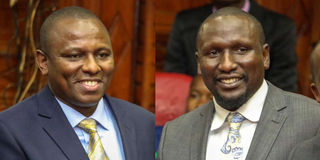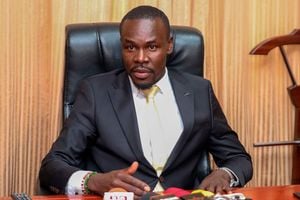
Former Ndaragwa MP Jeremiah Kioni (centre in black suit) joined by Kikuyu elders during the Limuru 3 meeting at Jumuia Conference Centre in Kiambu on May 17, 2024.
The August 9, 2022, general election marked a major shift in voting patterns with socio-economic interests rather than ethnicity playing a vital role in how Kenya’s top seat was decided.
But that was short-lived as the more familiar politics of “our people” appears to be making a swift comeback with the much-anticipated Limuru III meeting setting the stage ahead of the 2027 polls.
Historically, ethnicity has played a major role in local politics, characterising the face of elections for decades. In the watershed of 2022, however, the changing political matrix [for a while] reduced the role tribes played in determining who would become Kenya’s president.
The over 14 million registered voters who cast their ballots based their decisions majorly on the prevailing cost of living in the country, marking a new dawn in Kenya’s political scene where ballots have been cast along ethnic lines.
Despite former President Uhuru Kenyatta throwing his weight behind his longtime political nemesis Raila Odinga of Azimio Coalition, the Kikuyu voting bloc abandoned their political kingpin to vote the other way.
The Kikuyu, who account for nearly 25 percent of registered voters, overwhelmingly voted for Kenya Kwanza leader William Ruto, negating any influence of Mr Kenyatta, a political supremo they had previously voted for twice as “one of their own”.
The voters were looking for a leader promising them growth after a decade of economic downturn under Mr Kenyatta’s regime.
In fact, for the first time, a President was elected in Kenya with a 25 per cent sweep in 39 counties out of the 47 devolved units. That was not the case in the 2013 and 2017 elections.
Nonetheless, the ugly politics of “our own” is slowly roaring back with Limuru III setting the stage for tribal and ethnic political groupings.
Fronted by Narc Kenya Party leader Martha Karua, Jubilee’s Jeremiah Kioni and former Laikipia Governor Nderitu Muriithi, the meeting was fashioned as a gathering to offer direction to the restive Mt Kenya region.
Throwing his weight behind the Friday meeting, Public Service Cabinet Secretary Moses Kuria said the conference provides a platform for leaders to chart the region’s path, adding that a debate on national resource-sharing will feature prominently.

A youth holds up a placard calling for justice during the Limuru 3 meeting at Jumuia Conference Centre in Kiambu on May 17, 2024.
The development came after Deputy President Rigathi Gachagua sparked a discussion on the ‘One Man, One Vote, One Shilling’ national resource sharing formula, one week earlier.
“We are going to have that debate because it is justified. We must talk about how our people are being given resources under the one-man-one-vote-one-shilling,” said Mr Kuria.
A new political formation, Haki coalition, was birthed at the meeting ostensibly to champion the interests of the populous Mt Kenya region and is to be led by Mr Kenyatta.
This is after the leaders criticised Mr Gachagua for allegedly failing to fight for and protect the interests of the region despite being the seniormost government official from Mt Kenya.
“We the people of the region have resolved we shall unite under one umbrella movement to safeguard our interests and to speak as one mountain with one voice,” said Mr Muriithi.
Against this backdrop, Prime Cabinet Secretary Musalia Mudavadi cautioned leaders against taking the country back to dark days when politics of ethnicity were commonplace.
He advised the political class that the era when politics were determined by ethnic configurations and engagements was long gone.
“If there is an election that went beyond ethnic and tribalism barriers where we saw configurations that had never been seen before and never been imagined was the election of 2022,” said Mr Mudavadi.
National Assembly Majority Leader Kimani Ichung’wa termed the meeting an ‘ethnic bigotry meeting’ aimed at propelling the politics of ethnicity and personalities that ended with the 2022 elections
“Limuru III talk belongs to the past. Ethnic bigotry has no place in our nation’s future. Let’s bury ethnic divisive politics and build a united, inclusive nation,” Mr Ichung’wa said.
His Senate counterpart Aaron Cheruiyot added that the meeting was heavily tribal and lacked an agenda for the larger Kenyan fraternity.

National Assembly majority leader Kimani Ichung'wa (left) and Senate majority leader Aaron Cheruiyot (right). Led by the two House leaders, President Ruto-allied politicians announced they will counter the Azimio-led protests next week.
Mr Gachagua argues that the populous Mt Kenya region has no apologies to make in asking for more revenue as it would be commensurate with its superiority in numbers.
“We have no apologies to make. We want equality and equity. We want fairness in sharing of revenue. We will be pushing that agenda not because we come from a region that has a high population but because it is the right thing to do,” said the DP.
The “one man, one vote, one shilling” proposal is a formula for resource allocation in Kenya that advocates for distributing government funds based on population size.
The idea is that every person should have an equal vote and, therefore, an equal share of resources, reflecting the principle that areas with larger populations should receive more government funding.
Mandera Senator Ali Roba faulted Mr Gachagua’s reasoning and asked him to understand that Kenya is defined by its people and its geographical boundaries equally.
He countered that the arid and semi-arid lands comprise over 80 percent of the land mass in Kenya, and it was imperative that resource allocation consider both factors.
“The historical disproportionate sharing of national resources under previous presidents seems to have cultivated a misguided belief among some Mt Kenya leaders that they are the rightful owners of Kenya, with the remaining 43 tribes merely guests,” said the former Mandera governor.
Tana River Senator Danson Mungatana on Wednesday told off Mr Gachagua and threatened to rally other regions to back a formula that sets a premium allocation to land mass as opposed to population. He said the one-man-one-shilling formula only benefits one community.
“Anyone planning to be president of this country can’t ignore counties with small populations. Anybody trying to ignore us will be doing so at his own peril,” said Mr Mungatana.
Saboti MP Caleb Amisi advised Kenyan voters against tribalism and urged them to be wiser in their decision-making come 2027 elections.
Warning against tribal profiling, the legislator said none of the 44 tribes in the country was a problem for the nation.
In ODM, a version of the politics of “our own” has gripped the opposition party over Mr Odinga’s succession as the former premier eyes the African Union Commission chairmanship.
His endorsing of his two deputies, former Mombasa governor Hassan Joho and his Kakamega counterpart Wycliffe Oparanya, to succeed him should he be appointed to the position, has left political leaders from Luo Nyanza region in a spin.
Some legislators fronting National Assembly Minority Leader Opiyo Wandayi as their preferred leader, insist that the Luo community must have a say in the party’s leadership in the absence of Mr Odinga.
Alego Usonga MP Samuel Atandi said there were capable leaders from the Luo community who can steady and steer the ODM ship.
“If Raila is going to the AU, we must have one of us from this region to steer the ODM party. Opiyo Wandayi you are our leader, do not fear, remain steadfast and battle it out to lead us,” said Mr Atandi.
Rarieda MP Otiende Amollo said there was no way the succession matrix can be discussed without involving the Luo community.

Former Prime Minister Raila Odinga and AU Commission Chairman Moussa Mahamat Faki at KICC, Nairobi, on November 27, 2018. Mr Odinga is bidding to succeed Faki as AU Commission boss.
“We have told him (Raila) that politically as a community, we have able leaders to take up the leadership mantle,’’ said Mr Amollo.
Awendo MP Walter Owino also argued that should Mr Odinga relinquish the position, then it should be open for any member to contest.
“…. if Raila exits, bearing in mind that Nyanza forms the majority of the membership of this party, the region must also be accorded equal opportunity to produce a candidate in the contest,’’ Mr Owino said.
In March, Coast leaders endorsed Mr Joho for president come 2027, saying it was time the Coast region had one of their own in the race to become the sixth president of Kenya.
Coast Parliamentary Group chairman and Wundanyi MP Danson Mwashako said the former governor has demonstrated the political zeal and will to lead regional unity and prosperity of the country.
“Coast has made a declaration. This time we are not going to be divided. We have endorsed our own, and , we will ask people to vote out any leader who goes against us,” Mwashako said.
Kilifi Senator Stewart Madzayo added that Mr Odinga should be succeeded by Mr Joho.
“Of all those who want to succeed Raila, no one matches Joho. No one. So, brothers, let’s unite and ensure we support Joho,” he said.
Kakamega Governor Fernandes Barasa has been at the forefront rooting for Mr Oparanya to succeed Mr Odinga.
“As leaders from Western region and ODM party leaders, we wil continue supporting Raila’s quest for the AU Commission chairmanship). … and if he goes to the AU, the only loyal deputy party leader to inherit his position as the ODM party leader is none other than Wycliffe Ambetsa Oparanya,” he said.
A section of Ukambani leaders have also been drumming up support for Wiper boss Kalonzo Musyoka to go for the presidency in 2027.
The region’s political leaders insisted the former vice-president must run for the country's job after sacrificing his bid three times in deference to Mr Odinga.
Machakos Governor Wavinya Ndeti said Mr Musyoka must not back down again in 2027 because the whole of the Ukambani region will rally behind him.
“It will be serious business for us in 2027 and that is why we must start early,” Ms Ndeti said.
“Kalonzo has sacrificed for a long time for Raila’s bid for presidency. Iit is now his turn to reciprocate by supporting our leader,” added the governor.







